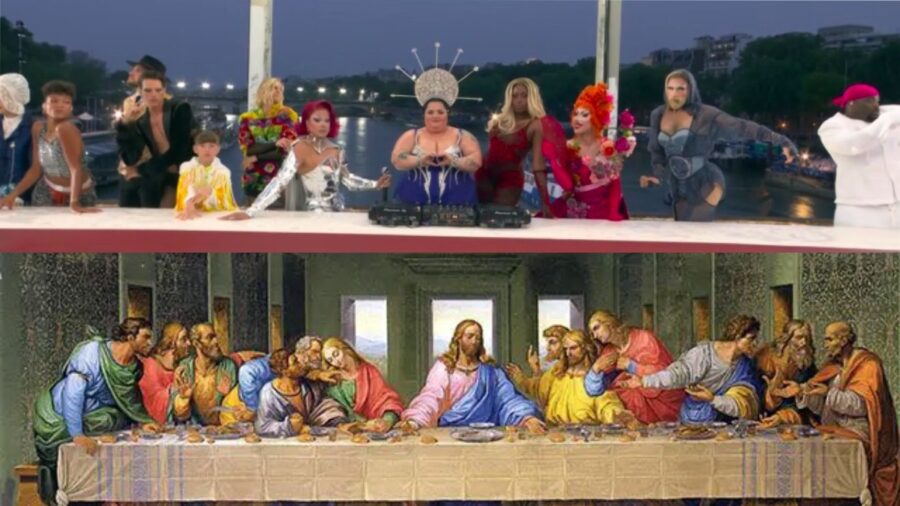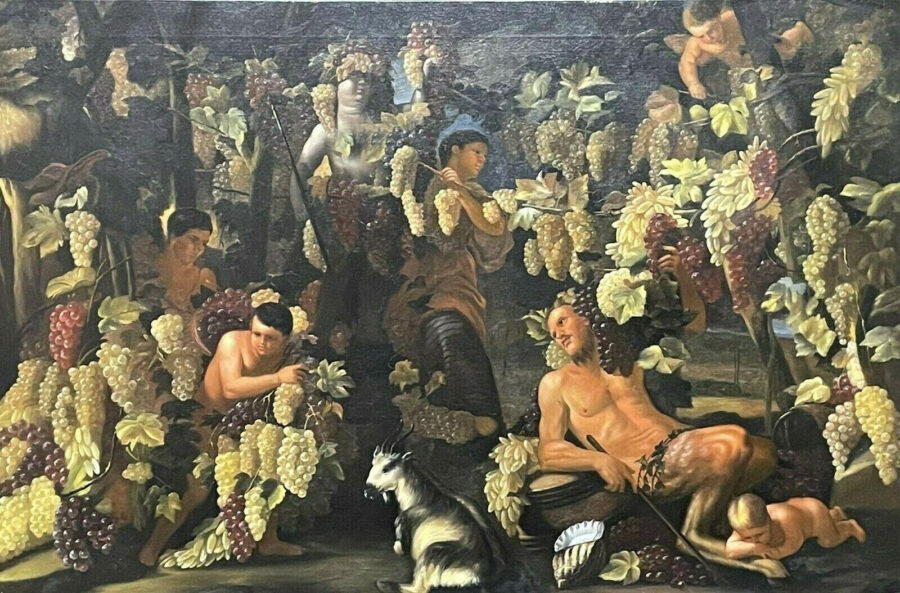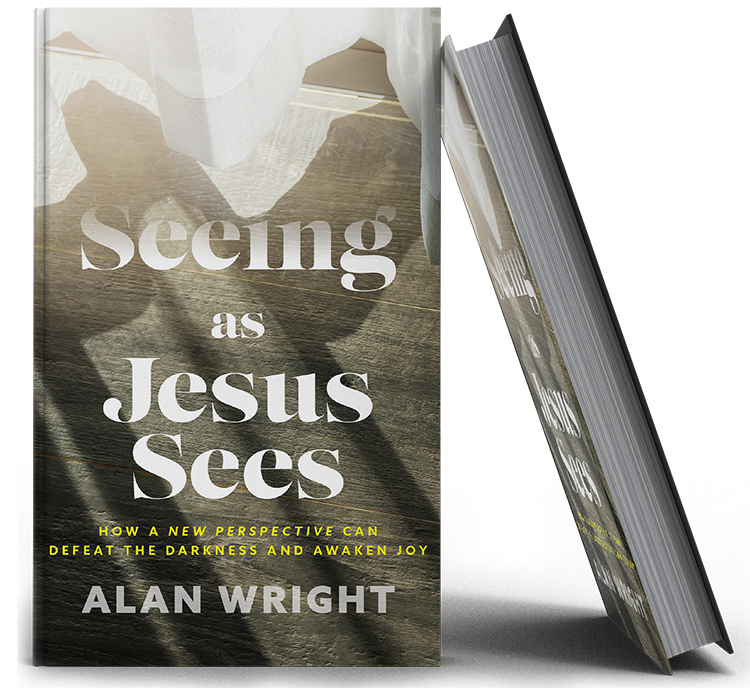
In my last post, I began an analysis of the underlying ideologies of the offensive Last Supper parody in the opening ceremonies of the Olympics. Instead of simply raging (though I think all Christians should be upset by the mockery of Christ), it’s better if we can understand, define and expose the deep clash of the spirit of the age and the Christian Gospel.
The Offensive Scene Revisited
If you missed last week’s post, I hope you’ll start there. But, by way of brief recap, I explained how much I love the Olympics. And, wow, the Paris games didn’t disappoint. I watched Sydney McLaughlin-Levrone run the women’s 400-meter hurdles last week. She was so much better than the rest of her semi-final heat that, according to analysts, she would have outrun her competitors even if the others were running the track with no hurdles.
Wow.
And how can four foot eight Simone Biles soar over 12 feet high from the floor while twisting and flipping?
I love the Olympics.
But the expansive opening ceremonies, that claimed the grandeur of the city of Paris itself as the venue, included a highly offensive scene that appeared to be a grotesque parody of DaVinci’s famous “The Last Supper.” It depicted a haloed obese woman in the center as a disc jockey flanked by various LGBTQ icons (including drag queens, a transgender model and prepubescent girl). Though Olympics ceremonies creators afterward denied that it was a mockery of “The Last Supper” and scrubbed it from YouTube amidst the backlash, the woman who played the disc jockey, a lesbian French activist named Barbara Butch, tweeted of the scene: “Oh Yes! Oh Yes! The New Gay Testament.” The French news outlets repeatedly referred to the scene using a play on words in French, “La Cène Sur La Scene Sur La Seine” which translates “The Last Supper on the Stage on the Siene.”



Does ”praying in the Spirit” referring only to the gift of tongues? If so, does that mean that a Christian who doesn’t have the gift of tongues can’t obey the Ephesians 6 exhortation to “pray in the Spirit at all times?”
The message of the New Testament about gifts of the Spirit is beautiful and clear—we have different gifts because we are like a body. We don’t need everyone to be a foot or an eye – we need the diversity of gifts. Some people have Spirit-led discernment but aren’t apt to teach. Others can teach with Spirit-inspired clarity but might not have great faith in praying for the sick. God designed the body of Christ to be a multi-faceted expression of redeemed humanity manifesting a diversity of spiritual gifts so that, together, we can be powerful and effective in the ministry of the kingdom of God.
I think every Christian should ask for the spiritual gifts. Paul says plainly “earnestly desire the spiritual gifts.” (1 Cor. 14:1). Ask the Lord for prophetic gifts. Ask the Lord for the gift of tongues. Ask the Lord for gifts of mercy, teaching, healing – whatever ministry gift your heart longs for, ask Him. But remember all gifts “are empowered by … the same Spirit, who apportions to each one individually as He wills.” (1 Cor. 12:11). God gives the gifts. We can ask Him for His gifts, but we can’t demand them or make them happen by our will.
Tongues is a form of “praying in the Spirit.” But not everyone has the gift. So, if Paul says “pray in the Spirit,” there must be other ways of “praying in the Spirit.” In coming weeks, I wasn’t to show you five of them—five ways to pray in the Spirit that will energize and fuel a powerful life of petition and intercession.
A Sneak Preview of the Five Ways to Pray in the Spirit
1) Praying God’s Word
God’s Word is full of His Spirit. When we pray God’s Word, we are praying Spirit-inspired revelation.
2) Listening to God and Praying
Every Christian is a sheep in the fold of the best Shepherd ever and sheep can recognize the voice of the shepherd (John 10:4). When we attune our hearts to the Lord’s promptings, we are praying “in the Spirit.”
3) Partnering in Prayer with Christ, your Intercessor
We never have to pray alone because the “Spirit himself intercedes for us with groanings too deep for words” (Romans 8:27) and we are assured “the Spirit intercedes for the saints according to the will of God” (Romans 8:27). We can discover Jesus as the best prayer partner ever and, when we partner with Christ in prayer, we are praying in the Spirit
4) Praying the God-given Desires of Your Heart
The scripture promises, “Delight yourself in the Lord, and he will give you the desires of your heart” (Psalm 37:4). It doesn’t mean that the Lord gives you everything your flesh craves. But the heart, the deepest internal place of motivation and affection in your being can come to a place of delight in God wherein He plants desires in you and when you pray those desires to God, you are praying in the Spirit.
5) Praying with Divine Love
God is love and all love comes from God. When we find our intercession fueled with mercy and love we can be sure that we are connecting with God’s own heart. Thus, praying with God’s love is praying in the Spirit.
In coming weeks, I’ll look forward to sharing more fully about each of the five ways to pray in the Spirit. May your prayer life be filled with Spirit-infused power!
I’m looking forward to sharing five ways of praying the Spirit that are available to every Christian. Here’s a sneak preview.


In the pagan festival, there was a ritual of ripping apart live animals and eating their raw flesh and a ritual known as “drinking the god.” By getting drunk on wine, it was believed the spirit of Dionysus would enter the pagan revelers and enable them to experience an ecstatic state.
I doubt the Olympic ceremonies creators had all that in mind as the celebration of Dionysus took place at a table resembling DaVinci’s Last Supper where Jesus gave the symbolic meaning of the wine – “this is my blood poured out for you, the cup of the New Covenant.” But the parody is unmistakably there.
In contrast to drunken orgies, the Lord’s Supper symbolizes the unity of the body of Christ. Paul’s admonition to never be drunk with wine but be filled with the Holy Spirit points to the glory of Gospel transformation: with God, transcendent experiences do not lead to debauchery but holiness.
When the Holy Spirit comes upon us, filling us with joy and love, we do not lose our minds, we gain them. We do not lose order, we find it.
Sociologists have observed that most cultures throughout history celebrate some form of “carnival”—times of public revelry with music, dancing, and often the use of masquerade. You might think of Mardi Gras with its masks and costumes and over-indulgence that precedes the liturgical season of Lent, historically a time of increased order and fasting and sobriety.
Carnival turns order upside down for a period, as if stretching the limits of society, emphasizing the fringe, the different, the unexpected. Some religious scholars suggest that carnival is a recapitulation of chaos and creation. In the beginning, the earth was formless, and void and the Spirit of God hovered over the chaos. When God spoke, He was bringing order.
God didn’t place humanity into chaos but into a “universe”— a word derived from “uni” which means “one” and the Latin root “versus” which mean to “turn.” So, chaos is about things coming apart, but in a universe all is turned toward one. Our secular universities have largely departed from their original mission to be a “whole” under “One” and have become “diversities” where innocent incoming freshmen learn that they might not be binary and might need to clarify their pronouns.
In other words, if all we have is diversity and no unity under God, then we have only carnival and no return to order. We have all masquerade and no reality. We have all Mardi Gras and no Lent.
So, this all brings us back to the not-so-subtle message of the Dionysian festival in front of a Last Supper table on the Seine river. The spirit of the age asserts that carnival, the upending of the normal order, is the pathway to “liberty.” The dissolution of normal identities and the exaltation of blurred identity is the way to be free, anti-Christ claims.
But The Last Supper and the good news of the Christian Gospel offer something altogether different and far more glorious. What Christ offers is unity amidst diversity—a unity that is found only through one living Head who is the Truth, the living way. Freedom does not come by reveling in chaos but by bringing order from chaos. Beauty isn’t found in diversity alone but in the mystical union of differentness (for example, the beauty of marriage between a man and a woman).
The world wants freedom, but Dionysian chaos never brings it. Jesus came to set us free! But it is a freedom found through submission to Him, worship of Him.
Reesie the beagle wasn’t “free” to be unleashed because he couldn’t control his nose. No person can be free without the beauty of order and discipline. A student might want to be “free” from having to study, but if he never does his homework, he won’t ever be “free” to graduate. A man might want to skip work and just be “free,” but the slackard won’t be free to buy food or health care.
Jesus came to set us free from the lies of self-absorption that tell us “you do you” and “do whatever feels right.” Ask any recovering alcoholic and they’ll tell you that real liberty isn’t the freedom to get drunk—real liberty is being free to not have to get drunk!
In Conclusion
When, as Christians, we see offensive scenes like the Last Supper parody in the Olympics opening ceremonies, I hope we’ll learn to take a deep breath, let the lament have its moment in our hearts, speak out about the offense, but also think deeply, asking: “What is the anti-Christ ideology behind the offensive material?” Where are the messages of the offensive material and the Gospel in conflict? What story is competing with the story of God’s love in Jesus Christ? I’d like us to think like that so we can be wise and pray more than we rage. Freedom is a wondrous virtue—but there are competing definitions of the word.
Let’s take our grief over the Olympics ceremonies to Christ and ask Him to empower us with grace to tell the world the better story of freedom, the story of a Savior who came to make us free indeed.

THE SEEING AS JESUS SEES BUNDLE
Pastor Alan's groundbreaking new book will empower you to discover the wonder and beauty you've been missing and clear away needless frustrations and misunderstandings. If you long to live with greater joy, victory, and wonder, let Pastor Alan Wright lead you through the Scriptures to the Savior's side to see everything from His perspective. You're going to love the view! When you donate to AWM this month, you'll receive a copy of Seeing as Jesus Sees and complimentary companion content to enhance your journey!
When You Donate You'll Receive:
• A Copy of Seeing As Jesus Sees
• Access to the Seeing as Jesus Sees Video Companion Series
• 6-week Seeing as Jesus Sees Reading Plan
• The Seeing as Jesus Sees Companion Study Guide
LEARN MORE >

